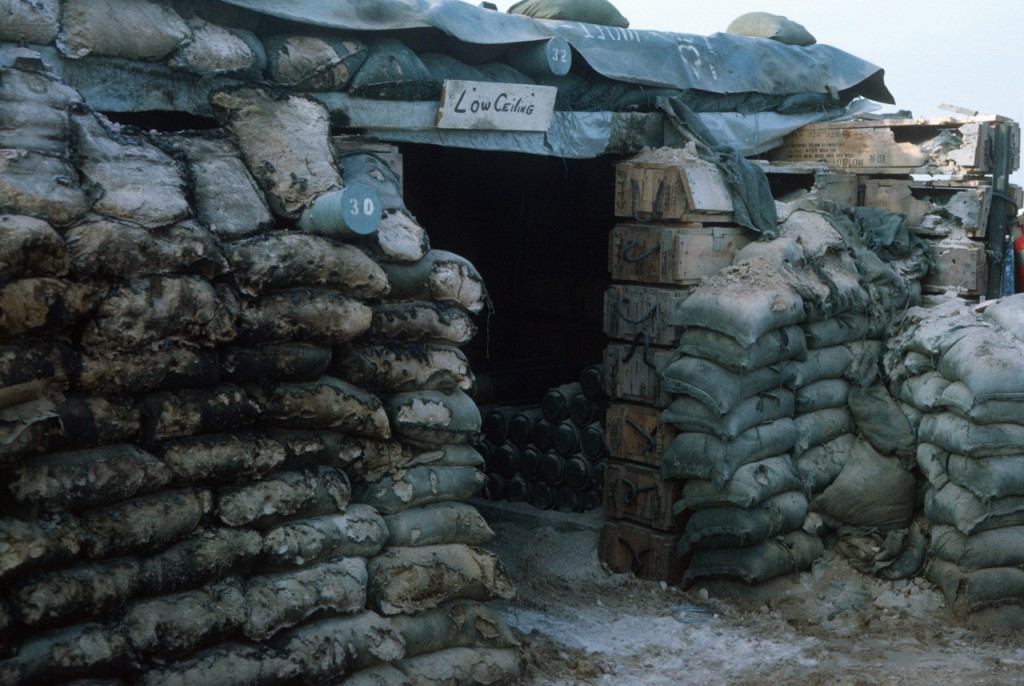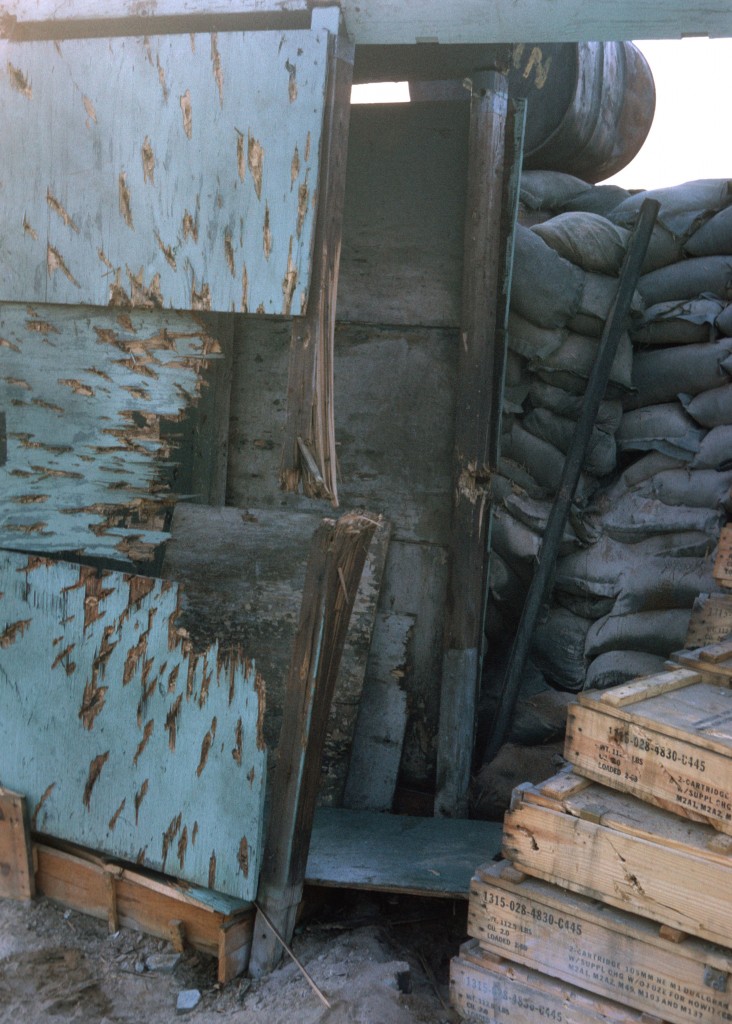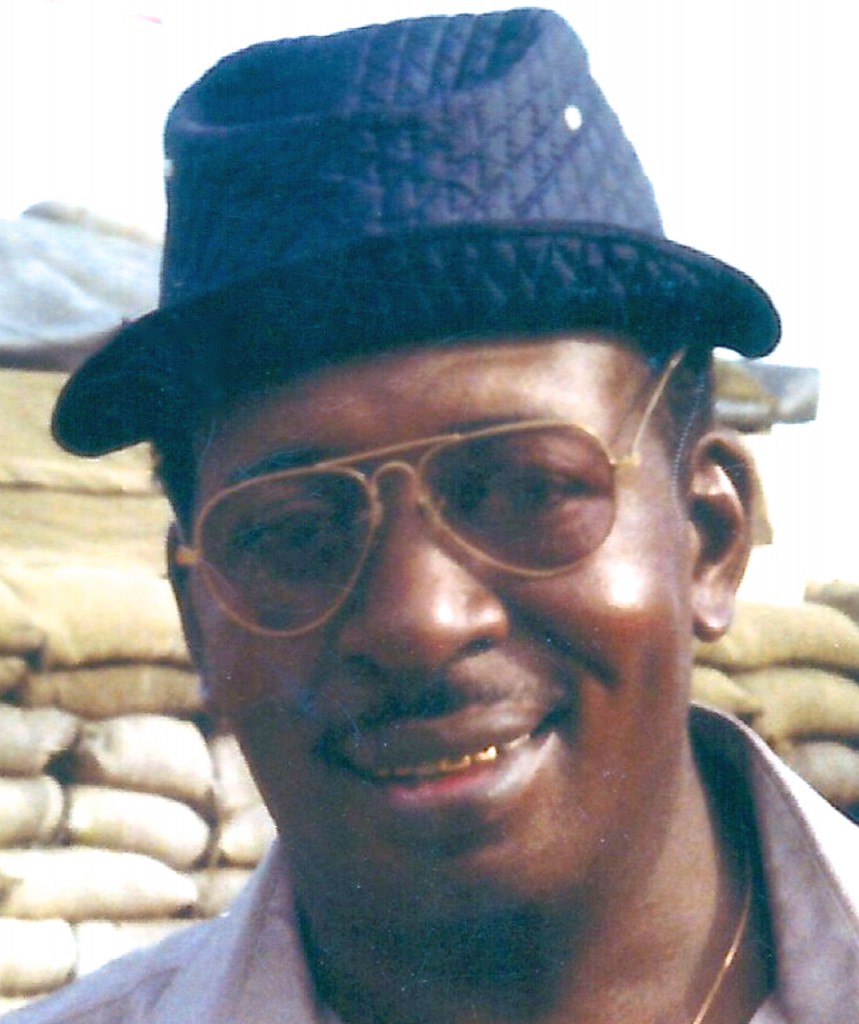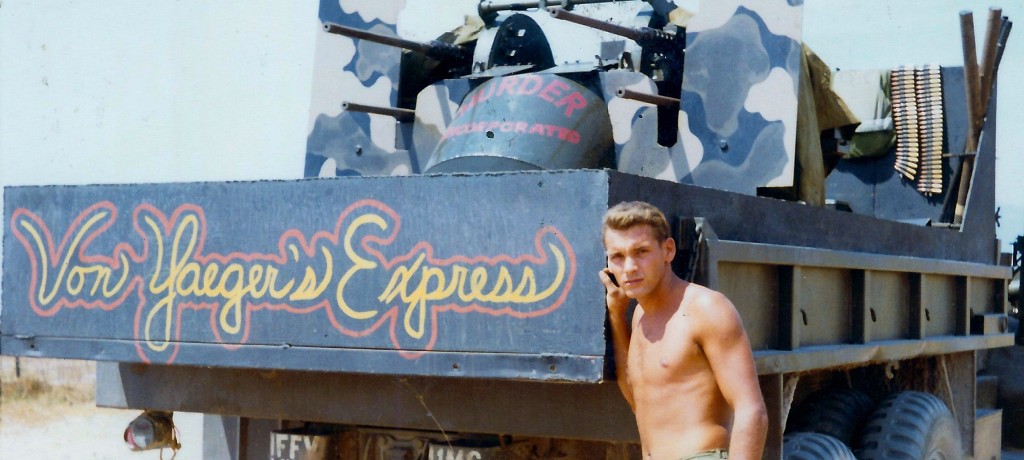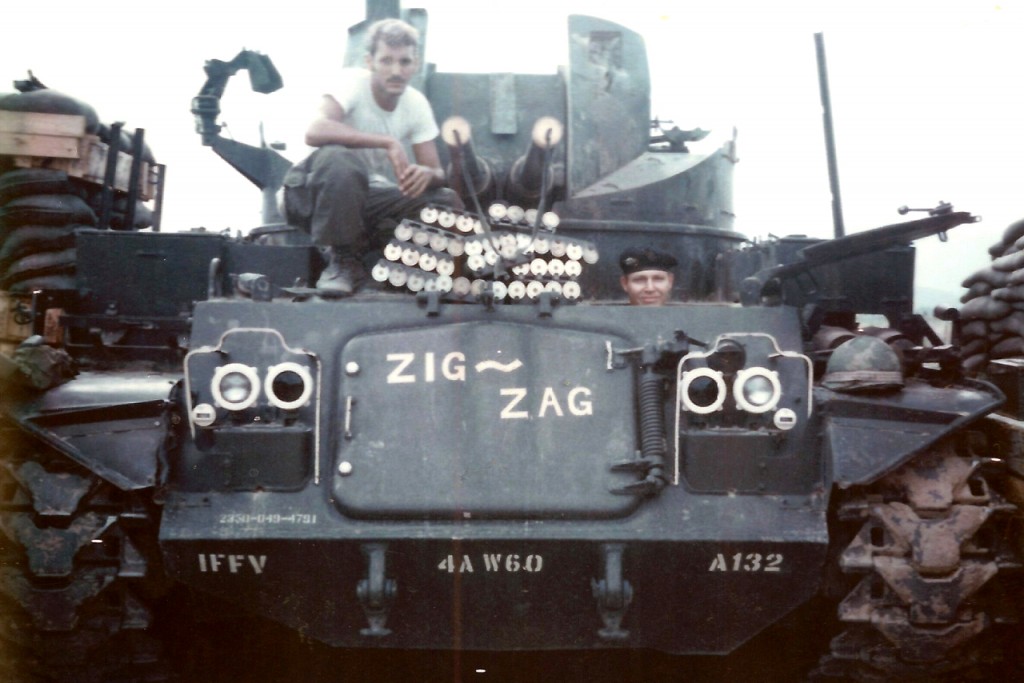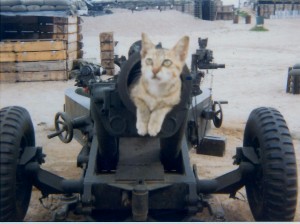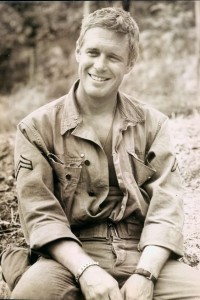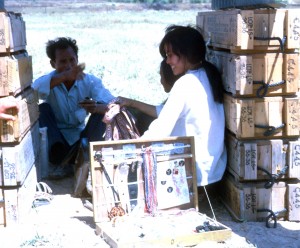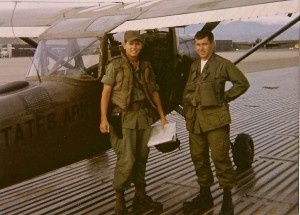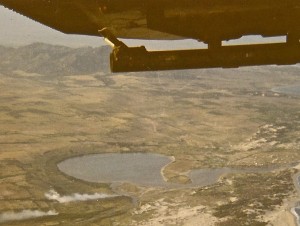An Occupational Hazard
I am in the guard tower by the main gate when two guys come up to the wire on bicycles with two girls riding on back. The girls are prostitutes and the guys are South Vietnamese soldiers in uniform. I turn my M-60 machine gun on them and I’m ready to blow them away. There’s a 1500 meter no-go around our perimeter, and I can’t be sure these guys aren’t Vietcong. I call back and say send Vin our interpreter out to talk to them. Along with him the captain comes out, the First Sergeant comes out, Chief of Smoke comes out, and everybody gets to talking to them. They say they just want to drop these girls off and come back and get them later.
They leave the girls and get on their bikes, and then everyone else goes back inside. As these guys are riding off the VC open up on them with AKs, catch them in a cross fire and kill them. I can’t believe what I am seeing and start laughing. Right there in the dirt they go down. I’m thinking, You dumb idiots, how damn stupid can you be? I call back and say, “You’re not going to believe this. The VC just killed those two ARVNs right outside the wire. Two bikes out there and two dead guys.” They say, “Well we got to get the bodies back.” So we go out to get the bodies back in and I am waiting to get shot too. When you get down to it, in the Vietnamese culture these guys were disgracing the Vietnamese people by turning girls into prostitutes. That’s why the VC shot them. They don’t bother me while I’m gathering the bodies, I guess because I didn’t bother them.
Chasing the NVA
It was a Sunday afternoon and a Chinook helicopter was on its way out to us with a load of ammo. Freight Train was the name of the Chinook, and it had everything hanging in a sling beneath it: Claymore mines, grenades, small arms ammo, C-4 explosive, artillery rounds. As it approached the battery the sling broke and dumped everything on the ground. The pilots tried to land to retrieve the load, but started getting shot at. They left and at a safe distance radio’d into LZ Sherry that they needed somebody to come out and help get the ammo back.
If this ammo fell into enemy hands they would put it to good use, as road mines, booby traps and ammo for their black market M-16s.
Top asked for volunteers to go get the ammo back. I turned around to walk away and Top said, “Where you going?”
I said, “To get my gear.” I was his first volunteer and when I got back there were sixteen of us.
The Chinook came into LZ Sherry and took us out to the site, where we ran into a real hornets nest. Over the ammo site we started taking heavy fire. The pilot didn’t want to land, or even hang around, so he just dumped us out the back cargo gate like a load of gravel. It felt like we were twenty-five feet in the air. Even his crew chief went out because he wasn’t expecting it. He was standing with us in the back and went out with everybody else. It was not his intention to go at all, believe me. We all landed in a pile on the ground. The crew chief was so pissed he started firing his .45 at the Chinook as it flew away. I said to him, “You might want to save that for the guys out there. Don’t worry about the guys in the chopper, we can kill them when we get back.” It was funny.
We spread out along a rice paddy dyke and the VC retreated. Top is walking back and forth on the berm yelling, “Can’t you take these guys?”
I said, “Can do, Top,” and I took off running after them toward the tree line. A quarter of a mile away I was all by myself. I found a trail and followed it down to a place down by a creek that looked like a perfect ambush location, with sheer rock up on either side with a big teak log laying across the creek. At the same time I noticed tracks indicating a very large force had been through there. The adrenalin was pumping, and I said to myself, Good God what are you doing out here in the middle of nowhere with everybody else way back there? You got no help, no radio; you got nobody.
Now I was afraid of what’s in front of me. We didn’t have near the ammo or personnel to take on a large force. I dropped down on one knee and made gestures like I’m calling my main force up. The chopper has been making short in and out runs picking up small loads of ammo, not staying long or putting down on the ground, so maybe they’re thinking it’s troops coming in and I was the main force. At least that’s what I hoped.
After a little while I turned and ran like hell. There were lots of booby traps out there on the trails, so I’m bustin’ making my own path. I made it back to the helicopter, maybe forty-five minutes later. Top said, “Where the hell you been? We thought you bought the farm.”
“No, I was running them down, doing what we’re supposed to do.”
Top said, “You bring anything back?” He meant a weapon, recovered ammo, or anything to show I’d encountered the enemy – I suppose for some kind of citation.
I said, “No, Top, I didn’t bring anything back. I’m not real interested in that.” A Special Forces squad scouted the area the next morning and reported back to us the we had run into the 33rd NVA Battalion out there: 2400 of them. I’m glad I didn’t go hunting for stuff.
We loaded the ammo into a new sling and took it back to Sherry. We couldn’t use any of the artillery rounds because they had been dropped. We hauled them a few hundred yards off the perimeter and had a demolition crew come out to blow it all up. I got only one picture because the shrapnel started falling all over the battery and we had to dive for cover.
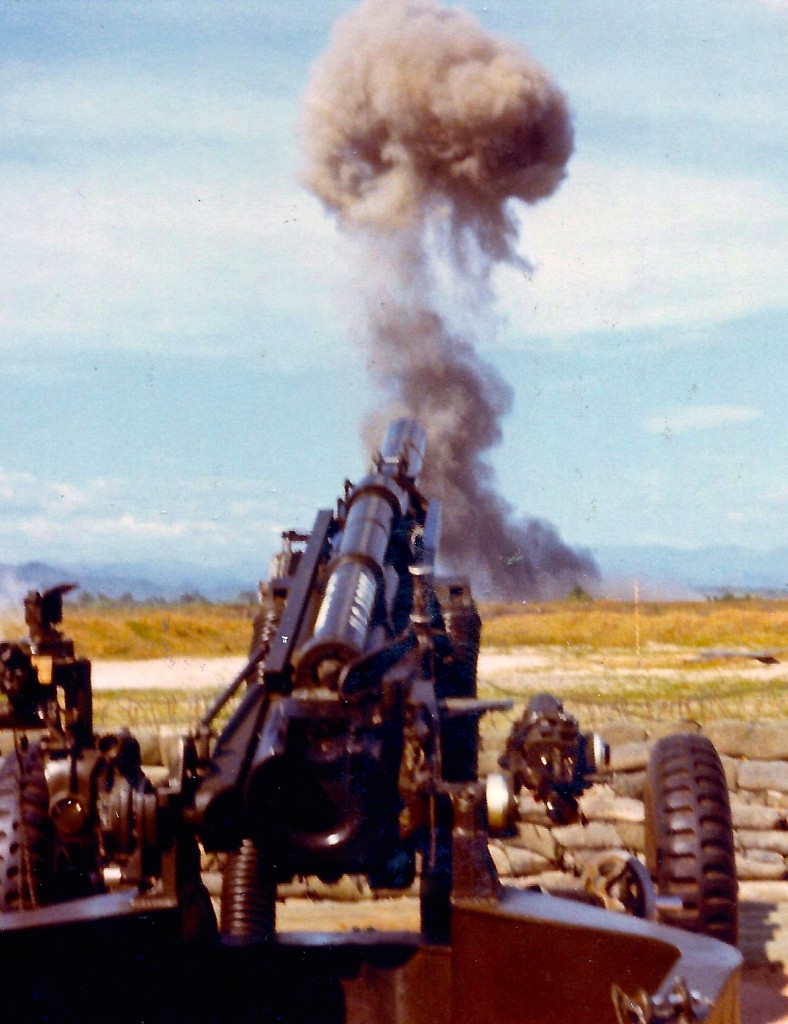
The Ernie Rich Memorial River
Everyone in the field in Vietnam encountered at least one close call before it was all over. This one of Ernie’s is no double the most bizarre in the annals of the Vietnam conflict. It hinges on the geographic location of LZ Sherry in a basin of rice paddies that, while five miles from the South China Sea, was just a few feet above sea level. During monsoon season when the ground was saturated it gave off a faint fishy odor.
We got hit the night before and were out filling sandbags to repair damaged hooches. I’m just outside the wire with Sergeant Rock, we called him that because he looked like Hercules. His real name was Dave Hansford. And Ed McConnell is with us, who got hit in the head with shrapnel the night before, blood all over him. He had a bandage wrapped around his head, and on orders from Doc we just used him for holding the sandbags while we filled them.
Normally filling sandbags you’d just dig down a couple feet, but I got goofy with the shovel and dug a hole I could not get out of it was so deep. All of a sudden the ground got like I was standing on Jell-O. Rock came over and I said, “Look at this, Rock. The ground’s moving. Get me the hell out of here.” So he reaches down and pulls me out.
He looks down and says, “Damn, Rich, you dug down below sea level.”
Then the whole bottom caved in and it was swift, rushing water. Rock went and cut this big ‘ol branch off with a machete. He said, “It can’t be that deep.” He threw the limb in and it disappeared. The current took it like pulling a cleaning cloth through the barrel of a gun, that’s how quick it disappeared. There was no finding the bottom of that thing. Rock said, “God, Rich, you’d have been MIA forever.”
I said, “Yeah, I would have been. The least you could do would be to name it after me.”
